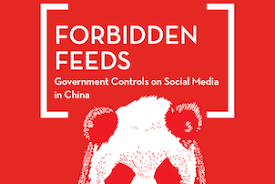China’s Tightening Grasp on Social Media Offers a Potent Tool of Repression for President-for-Life Xi Jinping, PEN America Report Warns
Government Control on Social Media in China, Ruthlessly Enforced on Users and Networks, Leaves Shrinking Space for Expression and Dissent
NEW YORK—Offering a detailed analysis of digital rights today and a chilling preview of their future in China, PEN America announced the release of Forbidden Feeds: Government Controls on Social Media in China.
https://pen.org/forbidden-feeds/
This is the press release….
From the leading US free expression organization, the 90-page original research report demonstrates how the government’s grip on social media constricts free expression in China, and how the scope and severity of censorship has expanded under President Xi Jinping. With an increasing array of technological, legal, and ideological tools at the government’s disposal, Beijing is ever more able and willing to systematically erase expressions of dissent and calls for social change, silencing internet users who dare cross ever-shifting red lines and shutting off channels of circumvention under the banner of “cyber sovereignty.” The report takes a particular look into how these constraints burden writers and other creative professionals. Outspoken writers or artists risk total banishment from social media platforms, destroying their ability to reach a wide audience in China and, for some, ending careers altogether.
“China has managed to offer its citizens a lively social media universe that is heavily policed and has successfully choked off social media’s promise as a vehicle for free social, political, and creative expression,” said PEN America Chief Executive Officer Suzanne Nossel. “Chinese authorities have managed to prove wrong the hopeful notion that the rise of a vibrant digital realm would inevitably herald greater ideological and political freedom. Despite the ceaseless and inventive efforts of Chinese netizens to evade government censors, the systematic erasure of sensitive subjects and dissenting views, and the targeting of those who express them ultimately leaves those who speak truth to power forced to self-censor and withdraw from conversation, if not leave the country entirely. Chinese social media companies have no choice but to play an active role in enabling this system of repression—something American social media companies weighing entry into the Chinese market should bear in mind, while the choice is still theirs.”
Based on extensive interviews with writers, poets, artists, activists, and others personally affected by the government’s grip on online expression, as well as interviews with anonymous employees at Chinese social media companies, Forbidden Feeds lays bare the destructive impact of the Chinese government’s vision of “cyber sovereignty” on netizens who dare to dissent. The report also includes an Appendix that documents 80 cases in which Chinese citizens were warned, threatened, detained, interrogated, fined, and even imprisoned for online posts over the past six years. The wide-ranging content of these posts, which touch on everything from Tiananmen Square to issues such as land rights and local corruption, demonstrates the ruthless enforcement of information control and the heightened risks facing those who dare test ever-evolving methods and powers of censorship.
In Forbidden Feeds, PEN America argues that the Chinese government engages in political censorship under the guise of countering so-called “online rumors”, promoting a definition of fake news driven more by political control than regard for the truth. Online censorship is also used to protect the reputations of powerful individuals, as well as to ensure no social media figures gain so great a following as to pose a threat. As Xi Jinping extends and consolidates his rule, China offers a chilling blueprint to other authoritarian governments aspiring to implement total information control. The report also notes, however, that China’s foresight about the risks social media would pose to the party’s hegemony has allowed them to construct a unique system of control that may prove alarmingly sustainable.
As well as analyzing the impact of China’s sophisticated surveillance and censorship mechanisms on Chinese social media companies and their users, Forbidden Feeds notes that foreign social media and technology companies cannot hope to enter the lucrative Chinese market without becoming active participants in these widespread human rights violations. Forbidden Feeds offers recommendations to the governments of China and the United States, members of the international community, and private social media companies, urging them each in their capacities to commit to ensuring free and open expression online and to ending the practices of or refusing to comply with online surveillance and censorship that flies in the face of universal rights to free expression and international law.




